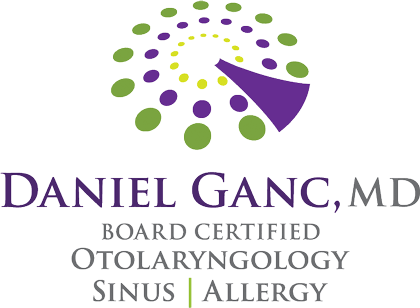Allergy services:
Testing, Shots, and Drops
Allergic rhinitis (allergies of the nose) can seriously impact your quality of life. They can cause discomfort and even avoidance of otherwise-pleasurable activities. However, with the right treatment, you can conquer your allergies.
Dr. Ganc and his staff offer a full range of allergy services, from initial testing and diagnosis to various options for treatment like shots and drops.
Allergy testing
As the first step to treating your allergies, we will perform tests to find out which allergens are leading to your symptoms.
Your allergies can be tested either via a skin test or a blood test. In the majority of cases, the skin test is appropriate and works quickly and reliably.
Your allergy test at the office of Dr. Ganc will check for sensitivity to a variety of environmental allergens, including grasses, weeds, tree pollen, dust mites, molds, cats, and dogs. Food allergies will also be tested.
Skin test
There are two steps to a skin allergy test:
- Skin prick test
We apply a small amount of allergen (the substance that might cause an allergic reaction) to a pricked area of skin and observe any reaction. - Intradermal test
If the skin price test shows no reaction, we perform the more sensitive intradermal test, where we inject a small amount of allergen under the skin.
Blood test
Allergy blood tests look for substances in the blood called antibodies. Blood tests are not as sensitive as skin tests but are often used for people who are not able to have skin tests.
The most common type of blood test used is the enzyme-linked immunosorbent assay (ELISA, EIA). It measures the blood level of a type of antibody that the body may make in response to certain allergens. IgE levels are often higher in people who have allergies or asthma.
After the tests
After allergy testing has been done, Dr. Ganc will review the results and determine a treatment plan for you, which might include allergy medications, avoidance of allergens, and allergy shots or drops.
Allergy shots
Injection immunotherapy (allergy shots) is highly effective method of treating allergy symptoms over the long run. By injecting very small doses of concentrated forms of the problematic allergens (allergy causing substance), and increasing the dosage over time, you build up a tolerance to the allergen. This tolerance decreases your sensitivity to the allergen in the environment, reducing the patients allergy symptoms by changing your body's overreactive response to the allergens, rather then just treating the symptom with allergy medicines.
There are two phases to allergy shot treatment:
1. The build-up phase
Initially, you will receive shots weekly or twice-a-week (if you wish to reach the maintenance phase sooner). Over time, you will receive increasing amounts of allergen in each shot. This phase typically lasts at least 4 months.
2. The maintenance phase
After the build-up phase, you will be receiving the maximum dosage of allergen. During this maintenance phase, the shots will space out to every 2 weeks and eventually to every 4 weeks.
Allergy drops
Some patients with allergies are not good candidates for allergy shots. Reason include fear of needles, frequent travelling, and/or difficulty making it to the office. In these cases, Dr. Ganc might recommend sublingual immunotherapy (SLIT) or allergy drops. Allergy drops are placed under the patient's tongue.
The principles behind allergy drops are similar to those behind allergy shots: help the patient build up a tolerance to the allergy-causing substances.
The build-up phase with allergy drops generally lasts 3 months, and then you begin the maintenance phase, which generally lasts 3 to 5 years.
FAQ
Allergy shots
Allergy drops
Contact Us
Your feedback and questions are important to us. Please contact us and let us know how we can assist you. If you would like to schedule an appointment, let us know, and someone will call you to schedule.




